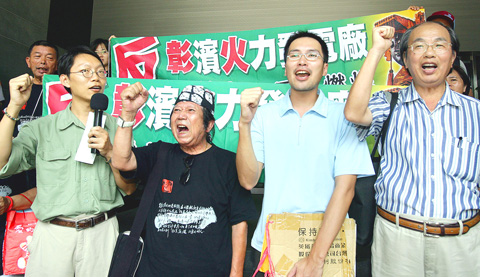The Environmental Protection Administration (EPA) yesterday came under fire from environmental groups that accused the agency of violating the Environmental Impact Assessment Act (環境影響評估法) in relation to a proposed power plant.
At a meeting yesterday of the environmental impact assessment (EIA) committee tasked with reviewing the plans for the coal-fired Changpin Industrial Park (彰濱工業區) power plant, environmental groups said the project could not be reconsidered as a new proposal because it had already been rejected by another EIA committee.
In response, the committee postponed the evaluation yesterday, saying it would look into the allegations that the review would violate procedure.

PHOTO: CNA
The activists had filed a complaint about the matter with the Control Yuan.
“Last April, the Changpin power plant was found to be ‘unfit for development’ ... However, [Taipower found a loophole in the law] and withdrew the project before the committee could make its recommendation to the EIA panel,” said Taiwan Environmental Protection Union (TEPU) chairwoman Gloria Hsu (徐光蓉), who served as chairwoman on the committee last year.
In the EIA process, a case is usually first reviewed by an EIA committee; once the committee is satisfied that it has received the necessary information to evaluate the project — a process that can take several years — the committee passes on its recommendation of “fit” or “unfit” to an EIA panel.
The panel usually accepts the committee’s conclusion.
“This year, Taipower refiled the power plant proposal as a new case, with few changes to the construction plan, in an attempt to go through the EIA process again as a first-phase project,” Hsu said.
Cases that do not pass the first phase of the EIA process, such as those deemed to have a sizeable environmental impact, are put to a second phase review that is more complex and usually has stricter requirements for the developer.
The EPA’s decision to let Taipower resubmit its proposal as new has set an unwanted precedent, said Thomas Chan (詹順貴), a lawyer who also served on the EIA committee that reviewed the Changpin proposal.
“Hung-du Alishan International Development Corp, the potential developer of a hotel on top of Alishan, which also received a negative recommendation from its EIA committee recently, withdrew its proposal from the EPA yesterday, too,” Chan said.
“This is like a defendant trying his luck with different judges until he gets a favorable verdict ... If the EPA allows this to happen, other developers are bound to follow suit,” he said. “In the meantime, the EPA and state-owned Taipower are wasting taxpayers’ money.”
As the nation already generates enough electricity for domestic usage, the electricity generated by the Changpin power plant would fuel further construction projects, TEPU Changhua district director Tsai Chia-yang (蔡嘉揚) said.
“Building more coal-burning power plants should not be part of Taiwan’s future; the government should practice what it preaches by reducing carbon emissions and electricity consumption,” he said.
An EPA official said, however, that the EPA’s interpretation of the Environmental Impact Assessment Act was within its rights and that Taipower had the right to withdraw its proposal before it reaches the EIA panel. Nevertheless, the EIA committee chair postponed the review until the Control Yuan has ruled on the legality of resubmitting projects.

RESOLUTIONS DEBATE: Taiwan’s allies said that UN and WHA resolutions cited by China and other nations ‘do not determine Taiwan’s participation in WHO activities’ A proposal to invite Taiwan to this year’s World Health Assembly (WHA) was rejected on Monday, resulting in Taipei’s absence from the annual meeting for a ninth consecutive year, although partners spoke up for Taiwan’s participation at the first day of the meeting. The first agenda item after the opening was a “two-on-two debate” on a proposal to invite Taiwan to participate at the WHA as an observer. Similar to previous years, two countries made statements in favor of the proposal, while two others expressed their opposition. Philippine Secretary of Health Teodoro Herbosa, president of the 78th WHA, accepted the WHA General Committee’s

Palauan President Surangel Whipps Jr arrived in Taiwan last night to kick off his first visit to the country since beginning his second term earlier this year. After arriving at Taoyuan International Airport at around 6:30 pm, Whipps and his delegation were welcomed by Minister of Foreign Affairs Lin Chia-lung (林佳龍). Speaking to gathered media, the Palauan leader said he was excited and honored to be back in Taiwan on his first state visit to Taiwan since he was sworn in this January. Among those traveling with Whipps is Minister of State Gustav N. Aitaro, Public Infrastructure

Premier Cho Jung-tai (卓榮泰) on Friday laid out the Cabinet’s updated policy agenda and recapped the government’s achievements ahead of the one-year anniversary of President William Lai’s (賴清德) inauguration. Cho said the government had made progress across a range of areas, including rebuilding Hualien, cracking down on fraud, improving pedestrian safety and promoting economic growth. “I hope the public will not have the impression that the Cabinet only asked the legislature to reconsider a bunch of legal amendments,” Cho said, calling the moves “necessary” to protect constitutional governance and the public’s interest. The Cabinet would work toward achieving its “1+7” plan, he said. The

Nvidia founder and CEO Jensen Huang (黃仁勳) hosted a dinner in Taipei last night with key Taiwanese suppliers to celebrate the successful mass production of the company’s new Blackwell AI systems. Speaking to the media earlier yesterday, Huang thanked Nvidia’s Taiwanese partners for their contributions to the company’s ecosystem, while also sharing his plans to meet with Taiwan Semiconductor Manufacturing Co (TSMC) founder Morris Chang (張忠謀). In response to rumors that Nvidia will launch a downgraded Hopper H20 chip for China in July, Huang dismissed the reports, saying, “That is not true.” He clarified that there